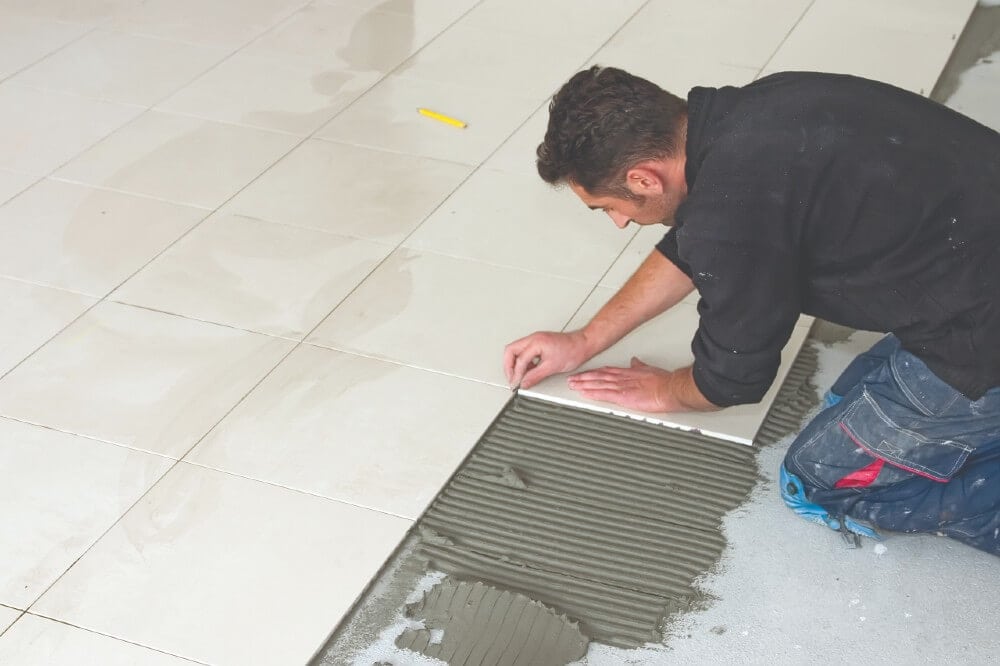What Is Qualified Labor?
Qualified labor refers to labor that has specialized training or a learned skill-set to perform the work. Consider these characteristics:
- A track record for quality and service — references of past work similar in scope and complexity to the current project is best
- Portfolio of completed installations
- A precedent for following industry methods and standards
- All required business licenses and insurance
The Importance of Qualified Labor
High-Quality Tile Installations
The importance of qualified labor starts at the very beginning with tile design. Architects and designers depend on the craftsmanship and technical expertise of qualified labor to successfully bring their design to reality.
Consider how qualified labor plays a part during the four phases of tile design:
- Schematic design
- Complete rough sketches.
- Determine the direction of the design.
- Complete conceptual images.
- Design development
- Select quality materials to guarantee the success of the project.
- Base material selection upon industry standards and manufacturer recommendations.
- Refine color options and finishes.
- Construction documentation
- Prepare detailed specifications for bid, giving contractors a clear set of instructions to build projects as designed.
- Tile specifications refer to the TCNA Handbook and ANSI Standards for installation guidelines.
- Select a qualified contractor based on training, skills, experience, and referrals.
- Construction administration
- The project is built and installed during this final stage.
- The architect and designer regularly meet and work with contractors to confirm that the project is being executed as envisioned, answer any questions, and resolve any construction issues.
Bart Bettiga, executive director of the National Tile Contractors Association (NTCA), explains that qualified labor sets the stage for a successful tile project: proper use of the materials, proper specification, and proper installation. Bettiga emphasizes that “qualified labor includes certification, it includes training, and I think that qualified labor is why projects last for a lifetime.”
Tile installations that don’t adhere to the architect and designer’s specifications or don’t meet the components of a successful tile project could result in:
- Cracked tile and an unstable floor
- Wrong slope in a shower floor, preventing proper draining
- Leakage into the subfloor or walls
- Incorrect offset for tile layout position, resulting in poor appearance/repetition of pattern
- Incorrect grout joint size for the product specification or grout that’s uneven in the installation
- Inconsistent level (lippage) from tile to tile
[Related: Download our Free Tile Buying Guide to Tile]
Customer Confidence and Satisfaction
Qualified labor is also crucial to give clients confidence that their tile project is going to be completed to their specifications and desires.
Nyle Wadford with Neuse Tile Service in Youngsville, North Carolina, explains that satisfied customers are a direct correlation to qualified labor. “The benefit of using qualified labor is that you’re getting a professional installer, working for a professional company, doing professional installations.”
“This kind of work,” Wadford says, “leads to satisfied customers because of the abilities that [the tile installer] has and the dedication to his craft and the professional installation of tile.”
Victor Fox and John Wirtz of Wirtz Quality Installations echo these sentiments. Qualified laborers provide a “quality product” and “consistency” so that customers know they will get the quality result they expect.
Roger Leasure of Northern California Tile and Stone — a company known for doing large malls, casinos, and resorts — speaks to other important elements that customers value: timeliness and safety. “When we show up on a massive project,” Leasure explains, “it’s going to be done fast and it’s going to be done safe.” The company’s use of qualified labor gives customers confidence they will receive a superior product in a timely manner.

